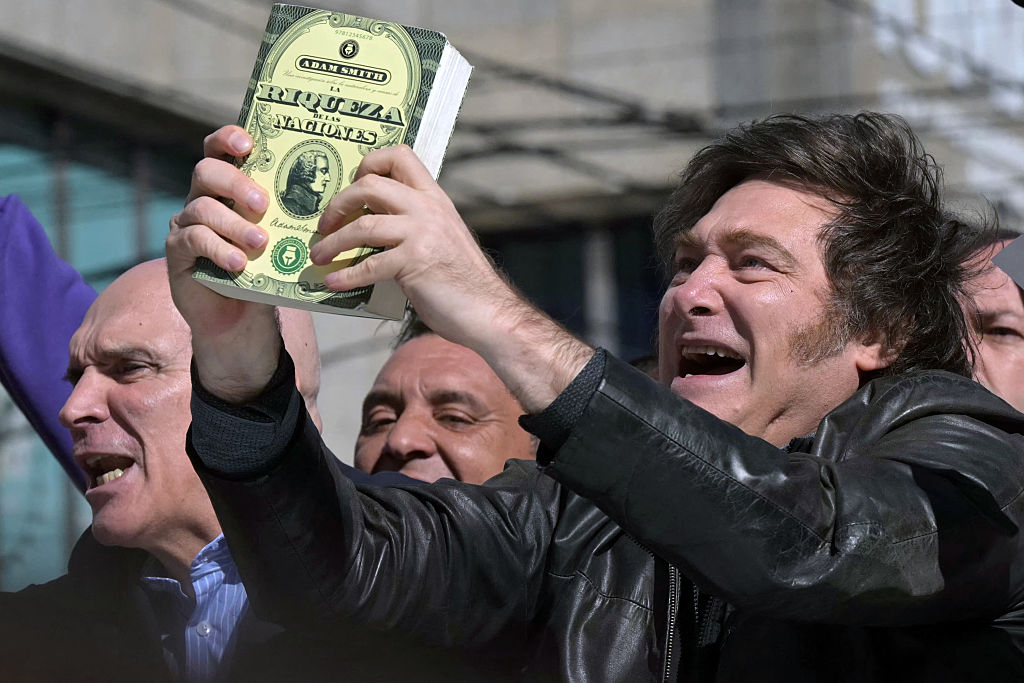BUENOS AIRES—Argentine President Javier Milei’s economic agenda is at a crucial electoral moment. Local elections will take place in Buenos Aires province on Sunday, followed by national legislative midterms on October 26, and their outcome could prove decisive for the remainder of his term.
On Sunday, voters will elect 23 senators and 46 members of the lower house for Buenos Aires province. While some polls show that the ruling coalition La Libertad Avanza is favored, the province is known as a traditional stronghold for the opposition kirchnerismo and peronismo, and its political inclination is also particularly relevant, as it represents almost 40% of the country’s population.
“This September 7th, the people of Buenos Aires will put an end to kirchnerismo‘s regime of lies, violence, corruption, and extortion,” Milei told business leaders at an event in the capital last week. “Now more than ever, we must say, ‘kirchnerismo never again,” the president added.
A second chapter will soon follow. On October 26, voters will elect half of the seats in the lower house (127), along with one-third of the Senate (24 seats), representing a tacit referendum on Milei’s administration, which so far has managed to recover the economy after a two-year recession and reverse the course of spiraling inflation.
For a country like Argentina—mired in several economic crises in recent years—falling inflation and the stability of the exchange rate are key assets for any government, and understandably so, the economy will be at the forefront in both contests. In addition, recent corruption allegations involving Karina Milei, the president’s sister and top adviser, add uncertainty to the electoral process and affect investor confidence in the prospects of completing the set of sweeping reforms implemented since Milei took power in December 2023. The president has denied wrongdoing.
For a leader who has surprised many since he disrupted the political sphere, a big question looms large: Can Milei, with his economic achievements, win the elections despite the political and financial tensions of recent months? With the president enduring a declining approval rating, most analysts insist that the outcome will be key for Milei’s economic plans, support in Congress, and reelection prospects in 2027.
Economic stagnation
Although the economy is projected to grow 5.5% this year after the contraction in 2024, the government’s economic model is showing its flaws. The economy stagnated in February and has been declining since May. Inflation has stopped falling in recent months and is now around 2% monthly. Consumer confidence, as measured by Universidad Torcuato Di Tella, plummeted 13.9% in August compared to July. Future expectations, according to Di Tella, also fell 13% month-to-month.
“The Argentine economy has been in a state of severe stagnation for over a decade, since 2011. Milei’s arrival aims to change the economic model a little to a slightly more open economy that is more productive,” Sebastian Menescaldi, associate director of Buenos Aires-based consulting firm Eco Go, told AQ.
Menescaldi warned that the government faces a complex panorama ahead of the elections. “Although [it is] managing to sustain the fiscal situation, [it is] trying to keep the exchange rate and inflation under control, but at the cost of a sharp rise in interest rates and a very restrictive monetary policy,” he added.
In an effort to contain pressure on the exchange rate, the central bank implemented a series of interest rate hikes. Interest rates in Argentina have risen from approximately 30% annually to 70%. This is the rate for wholesale fixed-term deposits (over 1 billion Argentine pesos), and is more than double the annual inflation estimated by consulting firms surveyed by the central bank. All of this is causing a contraction of household credit. Without credit, consumption grinds to a halt.
The goal is to keep Argentine pesos in short supply and avoid pressure on the exchange rate. Amid the recent depreciation of national currency, the government announced earlier this week that it would intervene in the foreign exchange market. The interest rate “will probably generate some downside pressure on economic activity. They will have to make changes in the exchange rate and monetary policy after the elections,” Menescaldi said.
Post-election reset
The measure may signal that the country is entering a new phase. Hernán Lacunza, director of Empiria Consultores and former Minister of Treasury at the end of President Mauricio Macri’s term, told AQ that Milei’s economic plan is in transition until October.
According to Lacunza, the political priority seems to be the nominal stabilization of the dollar and inflation, at the expense of interest rates and activity. But Lacunza warned that after the elections, the government will face the economic and political dilemma of resetting a long-term program.
“It’s feasible that Milei wins” in both upcoming elections, Menescaldi told AQ. For continued economic growth, Milei “will have to create a more attractive mix for foreign investment, and probably with a more depreciated exchange rate that will drive greater investment in the country and also encourage the private sector to borrow dollars,” he added.
Legislative support
The question in the political world is whether the ruling party can win the elections resoundingly and gain greater support for its structural reforms in Congress, where it will have to negotiate with the opposition due to likely insufficient majorities. More backing for the government may anchor investor expectations as long as the expected improvement in competitiveness allows for a lower equilibrium exchange rate (and higher wages in dollars).
Lucas Romero, director at Synopsis Consultores, a political consultant firm in Buenos Aires, told AQ that “Milei is trying to pass laws that he needs to provide the economy with systemic competitiveness.” These laws encompass labor reform, tax reform, pension reform, and key privatizations, all of which contribute to the sustainability of Milei’s economic program.
“What could be complicated is the issuing of the DNUs (official decrees to pass legislation without the Congress’s approval),” Romero added. “To overturn a DNU, you don’t need two-thirds of Congress; to overturn a DNU, you need a majority.” Milei has issued 64 DNUs since coming to power. For instance, Macri issued 70 in four years, and Cristina Kirchner issued a total of 78 in her two terms (eight years). This has led the opposition to criticize Milei for governing without Congress.
Beyond the DNU issue, a major risk for the government is whether Milei will win minimal decision-making margins to be able to bolster his economic program. That support will be essential for the administration’s next goal: 2027.
The president has already said he will seek reelection. To succeed, the economy will have to reset. More support from Congress may be insufficient to pass all the legislation the ruling party wants. Improving incomes will be decisive for Milei’s reelection bid. For now, low inflation and a controlled exchange rate could be enough to pass the next two electoral hurdles. As 2027 draws closer, voters may demand more.








